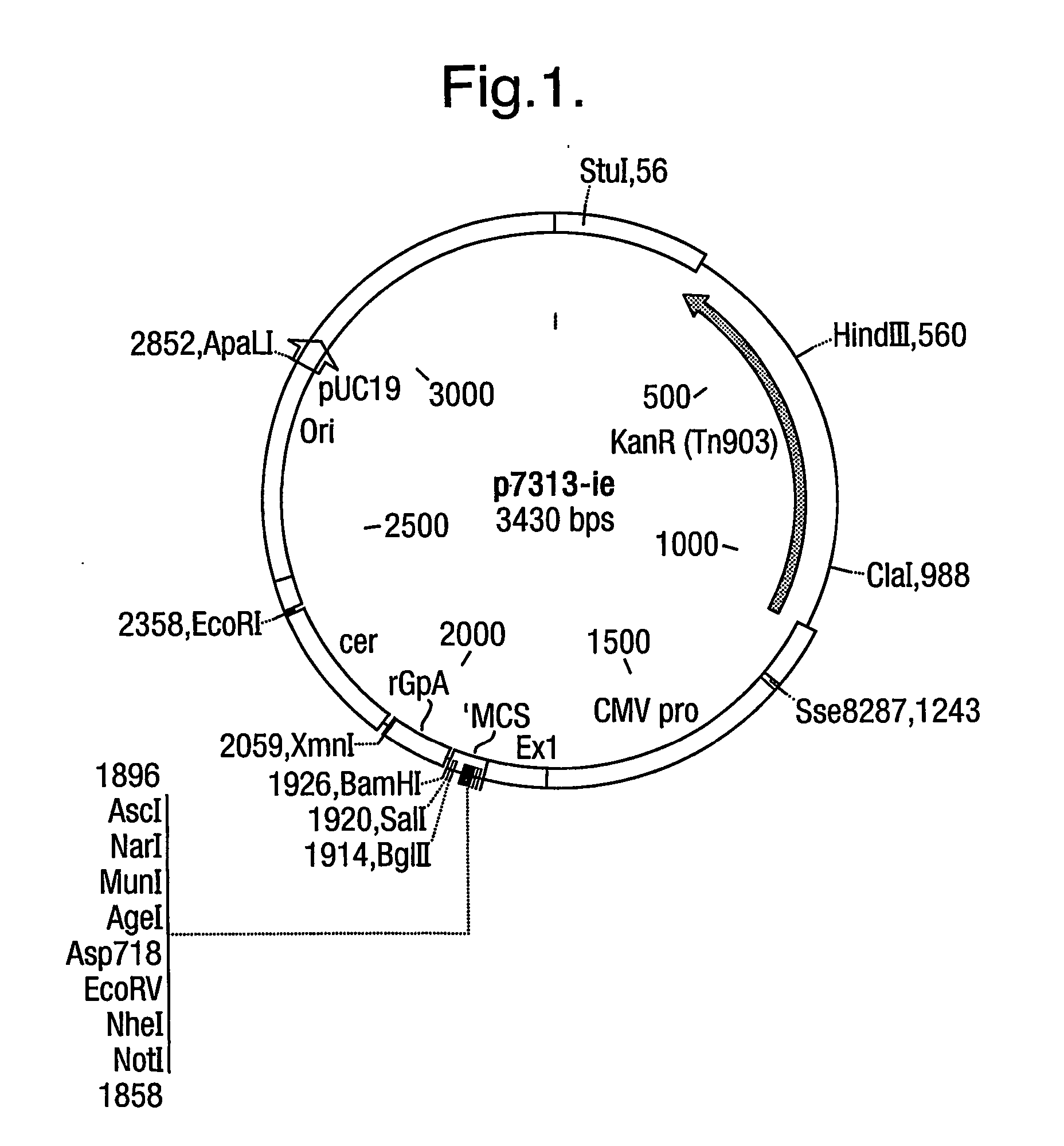Vaccine
a technology of nucleic acid and vaccine, applied in the field of dna vaccine, can solve the problems of inability to encode, efforts so far have not been successful, etc., and achieve the effect of reducing or preventing glycosylation
- Summary
- Abstract
- Description
- Claims
- Application Information
AI Technical Summary
Benefits of technology
Problems solved by technology
Method used
Image
Examples
example 2
Modification of gp120 and Nef / Tat(mut) Expression Vectors
[0192] gp120 constructs were modified to reduce secretion of the protein.
[0193] Generation of Constructs:
[0194] gp120 without a Secretion Signal (dsgp120, pRix 12—see FIG. 2 and 6)
[0195] The gp120 gene was PCR amplified from pgp120c using the following primers:
[SEQ ID NO: 14]5′120ds:5′GAATTCGCGGCCGCCATGGCCGAGCAGCTGTGGGTCACC[SEQ ID NO: 15]L01:5′GAATTCGGATCCTCATCTCTGCACGACGCGGCGCTTGGCCCGGGTGGGGGCCACG
[0196] Fragments were amplified using PWO DNA polymerase (Roche) and the cycle:
[0197] The products were cut with NotI and BamHI and cloned into p7313-ie to give pRix12 (FIG. 6).
[0198] Results
[0199] In 293T cells the vector pRIX12, which lacks the secretion signal, makes a good amount of a 60 kDa non-glycosylated protein that is not secreted.
example 3
Construction of Vectors for Expression of gp120 and Nef / Tat(mut) from a Single Plasmid
[0200] Vector Construction:
[0201] The gp120 Nef / Tat(m) constructs were generated by PCR stitching the gp120 and Nef / Tat(m) or trNef / Tat(m) orfs.
[0202] 5′ and 3′ Gp120, 5′ and 3′ Nef / Tat(m) and 5′trNef / Tat were amplified from pRix1. 3′trNef / Tat(m) was amplified from pNTm. The following primers were used:
[SEQ ID NO: 16]3′120: (antisense to):GCCAAGCGCCGGGTCGTGCAGAGA[SEQ ID NO: 17]5′120 / NT:GCCAAGCGCCGCGTCGTGCAGAGAATGGGTGGCAAGTGGTCAAAAAGT[SEQ ID NO: 18]3′NT (antisense to):GGGGAGCCGACAGGCCCGAAGGAA[SEQ ID NO: 19]5′NT / 120:GGGGAGCCGACAGGCCCGAAGGAAATGAAGGTCAAGGAGACCAGAAAG[SEQ ID NO: 20]5′120 / trN:GCCAAGCGCCGCGTCGTGCAGAGAATGGTGGGTTTTCCAGTCAC[SEQ ID NO: 21]5′trNef:GAATTCGCGGCCGCCATGGTGGGTTTTCCAGTCACACC[SEQ ID NO: 22]L01:GAATTCGGATCCTCATCTCTGCACGACGCGGCGCTTGGCCCGGGTGGGGGCCACG[SEQ ID NO: 23]L02:ACCACCTTGTACTTGTACAGCTCGCTCCGCCAGTTATCCCTCATGTCGCCGCCGCCGGGC
[0203] Fragments were amplified using PWO DNA polymeras...
example 4
Construction of Vectors to Invesigate the Effects of Glycosylation and Secretion, Inclusion of Tat and Inclusion of Gag (p17 / 24) and Nef and RT on gp120 and gp120 Fusions
[0206] Vectors were constructed as shown in FIGS. 33 and 34(schematic).
[0207] pix 28 and pRix29 (FIGS. 7 and 8) pRix28 and 29 containing ds gp120c NefTatm and ds gp120c trNefrat were generated by transferring the AccI-BamHI fragments from pRix6 (2315bp) and pRix11 (2123 bp) into similarly cut pRix12 (ds gp120c).
[0208] pRix30 and pRix31 (FIG. 27 and FIG. 9)
[0209] To generate glycosylated and non-glycosylated fusion vectors of gp120c Nef without Tat, the NotI-KpnI fragment was transferred from pRix11 (1580 bp) or pRix29 (1496 bp) into similarly cut pRix15, a vector containing Tat / trNef.
[0210] (pRix15)-Tat(mut)trNef
[0211] The genes for Tat and trNef were PCR amplified from pNTm using the following primers:
[SEQ ID NO: 24]5′Tat:5′GAATTCGCGGCCGCCATGGAGCCAGTAGATCCTAGAC[SEQ ID NO: 25]3′Tat:5′TTCCTTCGGGCCTGTCGGC[SEQ ...
PUM
| Property | Measurement | Unit |
|---|---|---|
| Fraction | aaaaa | aaaaa |
| Composition | aaaaa | aaaaa |
Abstract
Description
Claims
Application Information
 Login to View More
Login to View More - R&D
- Intellectual Property
- Life Sciences
- Materials
- Tech Scout
- Unparalleled Data Quality
- Higher Quality Content
- 60% Fewer Hallucinations
Browse by: Latest US Patents, China's latest patents, Technical Efficacy Thesaurus, Application Domain, Technology Topic, Popular Technical Reports.
© 2025 PatSnap. All rights reserved.Legal|Privacy policy|Modern Slavery Act Transparency Statement|Sitemap|About US| Contact US: help@patsnap.com



